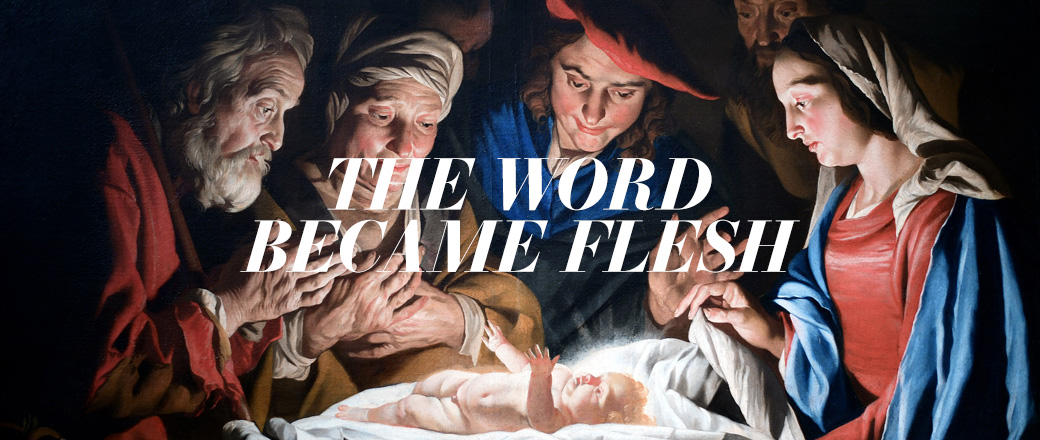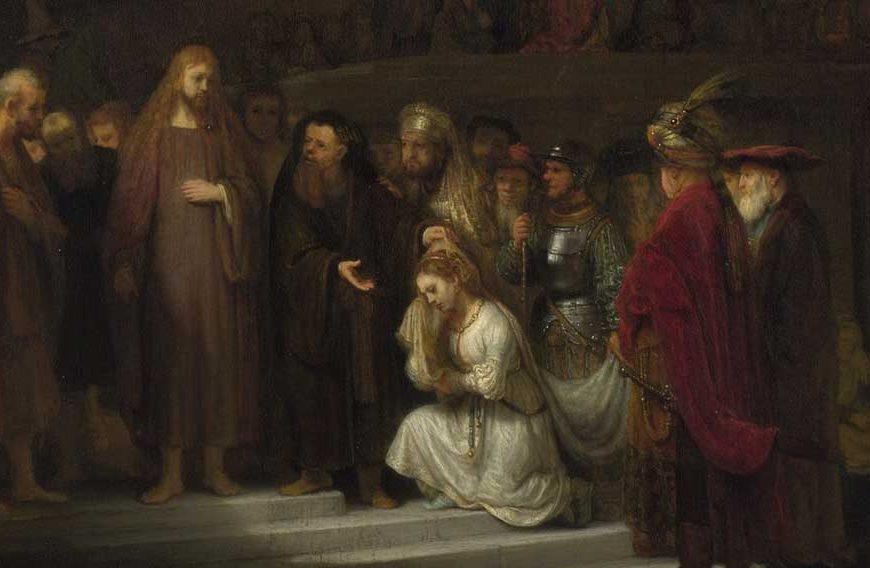I love Christmas carols. They are the soundtrack of the season.
As great as carols are, it’s possible to make it through the whole month of December, hear these tunes, and yet not tune in to what the carols are really saying.
On closer inspection, Christmas carols make some audacious claims. Consider just a few lines from Hark the Herald Angels Sing:
Veiled in flesh, the Godhead see,
Hail, the incarnate Deity.
Pleased as man, with men to dwell,
Jesus, our Immanuel.
What an absurd idea. God being limited to one place at a time? God learning how to walk? God… relieving himself? It’s almost offensive.
But this is actually the central claim of Christmas—not merely that a baby was born in a manger, but that this baby born in a manger was God in human flesh. That’s what we’re celebrating for the 2019th time next week.
The famous atheist Carl Sagan once said, “Extraordinary claims require extraordinary evidence.” I think Carl Sagan makes a reasonable point. So let’s consider some extraordinary evidence that on that first Christmas, God really did step down into history.
History Written In Advance
The Bible is a fascinating book, not least because it made many predictions or “prophecies” of events before they happened. This makes it possible to test whether it is just a human book or one that God was involved in writing.
The Old Testament is the first big section of the Bible, written hundreds of years before Jesus came. In its pages are prophecy after prophecy about a coming king called the Messiah.
In Old Testament times, the Jews dreamed of the day the Messiah would come and rescue their nation from oppression, sin and judgment. The Messiah was no less than the hope of Israel.
Many specific predictions were made about this Messiah: his birthplace, how he would be raised, how people would react to him, what his mission was—and many more. So let’s take a quick look at just some of these prophecies, to see if they check out.
I am a bit sceptical by nature. Maybe you are too. Maybe you suspect that these “predictions” were forged after the event to just make Jesus look like he was the Messiah.
But actually, history doesn’t let us draw that conclusion. All the Scriptures I quote below was translated into Greek two centuries before Jesus was born, in a well-known ancient text called the Septuagint. In other words, they appeared in history long before Jesus did, so they were definitely predictive.
We will look at these in rapid-fire. They throw up a lot of separate ideas, but bear with me—we will tie all of it together at the end.
The Identity of the Messiah
The first is from a prophet called Balaam. He said:
I see him, but not here and now. I perceive him, but far in the distant future. A star will rise from Jacob; a sceptre will emerge from Israel. (Numbers 24:17a)
A sceptre is a ruler’s staff. So in other words, this Messiah would be a ruler, and he would also be an ethnic Jew.
Next is the prophet Isaiah:
The people who walk in darkness will see a great light. For those who live in a land of deep darkness, a light will shine… A child is born to us, a son is given to us. The government will rest on his shoulders. And he will be called: Wonderful Counsellor, Mighty God, Everlasting Father, Prince of Peace. (Isaiah 9:2,7)
A second time here we have the mention of a star or a bright light associated with the Messiah’s birth. Also, he will be given lofty titles like “Mighty God”—and he will in some way form the foundation of government.
In another passage, God has more to say through the prophet Isaiah:
“You will do more than restore the people of Israel to me. I will make you a light to the Gentiles, and you will bring my salvation to the ends of the earth. (Isaiah 49:6)
So far the predictions we’ve looked at focus on the nation of Israel. But here we see that the Messiah’s saving work would extend to Gentile (non-Jewish) nations all around the world.
This next prediction came to King David:
“When you die and join your ancestors, I will raise up one of your descendants, one of your sons, and I will make his kingdom strong… I will be his father, and he will be my son. I will never take my favour from him as I took it from the one who ruled before you. I will confirm him as king over my house and my kingdom for all time, and his throne will be secure forever.” (1 Chronicles 17:11-13)
So the Messiah’s ancestry is narrowing. Not only will he be an Israelite, but he would be a descendant of King David, who came from the tribe of Judah.
The Messiah’s role is also narrowing. Not only will he be a ruler, but he will be a king ruling over a kingdom—a kingdom that never ends. The Messiah would also have a unique relationship to God: he will be called the “Son of God”.
Here’s another prophecy from Isaiah:
“The Lord himself will give you the sign. Look! The virgin will conceive a child! She will give birth to a son and will call him Immanuel, which means ‘God is with us’.” (Isaiah 7:14-15)
Here we read that the Messiah would be born of a virgin. And the people will regard him as Immanuel—God with us.
Just a couple more prophecies to go. The prophet Micah said:
“You, O Bethlehem, are only a small village among all the people of Judah. Yet a ruler of Israel, whose origins are in the distant past, will come from you on my behalf.” (Micah 5:2)
So it’s clear that the Messiah was expected to be born in Bethlehem.
A Most Remarkable Prediction
This last one is the most remarkable of all. It was spoken by Jacob, the father of the Jewish nation:
“The sceptre will not depart from Judah, nor the ruler’s staff from his descendants, until the coming of the one to whom it belongs, the one whom all nations will honour.” (Genesis 49:10)
Again we see that the Messiah would come from the tribe of Judah and that the nations of the world would honour him. But most fascinating is this line about the sceptre departing.
Long before Jesus, the Romans had captured Judea and made it a province of their empire. The Jews still held the sceptre there—in other words, they retained their ruling privileges. But all that changed in 7AD. Rome appointed a procurator in Judea, and took Jewish rule away.
This was devastating to the Jewish leaders. But they weren’t just upset because they lost the right to rule. They were heartbroken because it looked like this prophecy from Genesis 49:10 had been broken: the sceptre had departed, but “the one” had failed to come.
It’s said that in 7AD, the Jewish leaders went about in sackcloth and ashes, mourning, “Woe unto us, for the sceptre has been taken from Judah, and the Messiah has not appeared!”
Little did they know that a few days’ walk north, in the village of Nazareth, a little boy named Jesus was running the dusty streets with his playmates.
Do You Have Room for Jesus?
To summarise, we have looked at just a handful of prophecies, and things are getting really narrow. According to the Jewish Scriptures, the Messiah had to:
- be Jewish
- be from the tribe of Judah
- be from the family of David
- be born to a virgin
- be born in Bethlehem
- have an arrival associated with a star or a bright light
- provide a foundation for government
- be known about and worshipped throughout the world
- be acknowledged as a king, as God in human form, as the unique Son of God
- be born before 7AD
You could spend a lot of time troweling through history books but you won’t find many candidates that fulfil all of these predictions. But Jesus does. Remarkably so.
In fact, we’ve only compiled a list of ten predictions about the Messiah. We could look at another 90—among them that he would be executed, have his hands and feet pierced, that his executioners would gamble for his clothes, that he’d be buried in a rich man’s grave. The list goes on and on.
Every one of these prophecies were written in black and white hundreds of years before Jesus was born. Each of them was fulfilled down to the finest detail in his life.
Believing that God stepped into history that first Christmas isn’t a blind leap of faith into the dark. It’s a very sensible step into the light.
In the days leading up to Christmas, there is so much to distract us from what this holiday is all about. We can enjoy all of the Christmas tradition, and yet be just like Bethlehem’s innkeeper who had no room for Jesus.
Christmas carols are a call for us to invite Jesus into our homes and hearts. This Christmas, will you join shepherds, angels and wise men to honour the King of Kings?
Let every heart prepare him room
Come, adore on bended knee
Merry Christmas. Glory to God in the highest, and peace on earth!


















